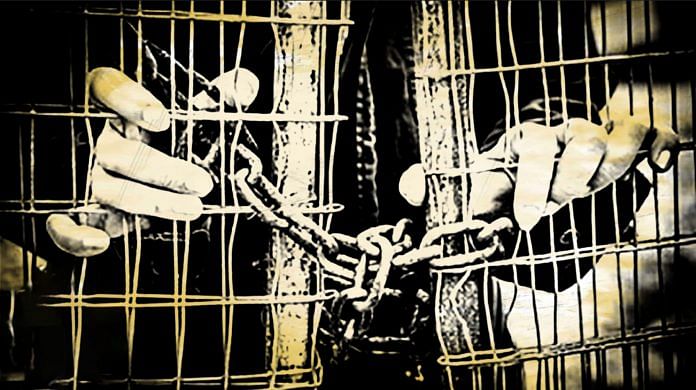New Delhi: Regina Khatoon was 12 years old when she was trafficked from Kolkata and taken to Pune.
There, she was made to work as a sex worker by her traffickers for four years. After a great deal of struggle, Khatoon was rescued by some local police personnel — following which she spent two years at a shelter in the city before finally returning home in 2012.
But throughout the period of her rescue and rehabilitation, not a single person told her that she was eligible for compensation from the government for everything she had been through.
Khatoon is not alone. Many human trafficking victims in India either don’t know that they can avail of government compensation or are daunted by the sheer amount of proof it takes to claim it, according to NGOs working in this field.
Lawyer Vipan Kumar, associated with anti-trafficking NGO Sanjog, said that according to the National Crime Records Bureau data, there were 38,503 victims of human trafficking between 2011 and 2019.
But replies to several RTI queries filed with government agencies have revealed that less than 100 have got compensation in these eight years.
ThePrint contacted the spokesperson of the Ministry of Women and Child Development (WCD) via e-mail for a comment on the low figures of compensation, but there was no response until the time of publishing this report.
However, a ministry official, who doesn’t want to be named, told ThePrint the matter of compensation is a state subject.
“The sheer amount of paperwork and the procedures may be causing the delay. But since it’s a state subject, each state will need to be consulted to understand what is the exact reason behind the low numbers,” the official said.
Also read: Football career dreams are making youth vulnerable to human trafficking trade
107 applied, 77 got compensation
Section 357-A of the Code of Criminal Procedure states: “Every state government in coordination with the central government shall prepare a scheme for providing to compensate [trafficking] victims who have suffered loss or injury and require rehabilitation.”
Most states and union territories have established a victim compensation fund, but, when lawyers in collaboration with Sanjog filed RTIs before the State Legal Services Authority (SLSA) and District Legal Service Authority (DLSA) in various states, the numbers shocked them.
The DLSAs and SLSAs are the authorities responsible for providing compensation to trafficking victims.
“We were expecting the numbers to be way higher given how rampant human trafficking is in the country,” said Kumar, who is one of the lawyers who filed the RTIs.
The RTIs revealed that between 2011 and 2019, only 107 victims of trafficking had filed applications for compensation with the district and state authorities. Of these, 85 were found eligible for receiving compensation, but the money has only been disbursed for 77.
On digging deeper, the NGO realised that these abysmal numbers were a result of a lack of awareness among the survivors about the compensation scheme, along with the arduous and almost impossible task of providing proof of having been a victim of trafficking.
“Stakeholders who are involved in the process of rescuing the victims and rehabilitating them are responsible for informing them that they can avail of compensation. But most times, the victims are never informed,” Nisha Mehroon, programme specialist at Sanjog, told ThePrint.
These stakeholders included the officials who rescued the victim, the superintendent of the shelter where the victim would have stayed for months after being rescued, as well as the NGOs working in the field.
Submitting proof is ‘nearly impossible’ for victims
Besides the low level of awareness, it was also found that the burden of proof falling on the victims acted as a major deterrent.
“To avail of compensation, it is the victim who has to collect and submit proof of her having been trafficked,” Mehroon said.
This is not an easy task because the proof needs to comprise the FIR from the police station of the region where the victim was rescued from as well as FIR from the police station of the area from where she went missing.
“Suppose the victim was originally from West Bengal and trafficked to somewhere in Maharashtra. As proof, she will have to submit FIRs from both the West Bengal Police as well as the Maharashtra Police,” Kumar said.
“This is nearly impossible as a lot of times the victim rescues herself by fleeing from the spot. So collecting FIRs is not easy,” he added.
Khatoon, now 25, said she was somehow able to arrange all the documents after social workers in Kolkata informed her of the compensation scheme.
In 2013, she had filed for compensation. But even seven years later, she is still awaiting her money.
“The compensation would really help me get my life in order, but I need it now. I can’t keep waiting for it forever,” Khatoon told ThePrint.
The lawyers also realised that in many cases, the DLSAs and SLSAs are either not maintaining the data properly or the data is full of discrepancies.
“This isn’t merely a question of money. This is a question of justice. There can be no rehabilitation in the real sense unless the victims are given an opportunity to rebuild their lives,” Kumar said.
The trafficking bill
Former women and child development minister Maneka Gandhi introduced the Trafficking of Persons (Prevention, Protection and Rehabilitation) Bill in July 2018.
The Bill was passed in the Lok Sabha subsequently, but it lapsed as it could not be introduced in the Rajya Sabha before the 2019 Lok Sabha elections.
The Bill provided for time-bound trials and timely repatriation of the victims as well as prosecution of those promoting or facilitating trafficking. It also provided for confidentiality of victims, witnesses and complainants.
The Bill hasn’t been reintroduced in the Parliament yet, but is reportedly likely to be introduced in the second phase of the Budget Session starting 2 March.
Also read: Assam child protection body will launch app on 14 November to fight child trafficking



